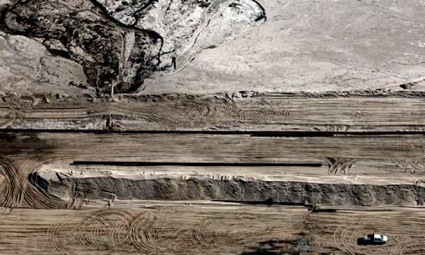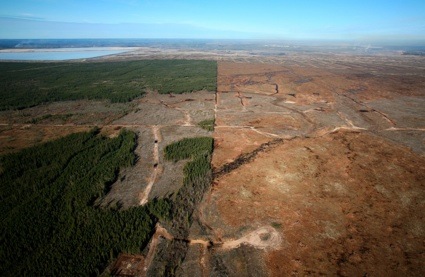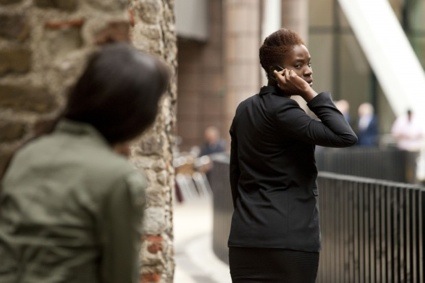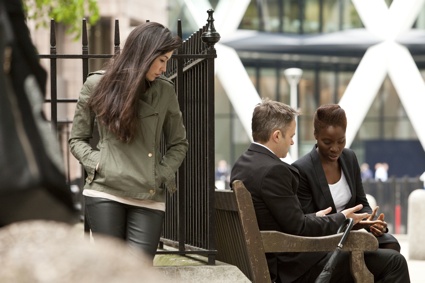 Photo credit: Amy Scaife
Photo credit: Amy Scaife
Oil City is a piece of site specific theatre by Platform that interweaves real ecological scandal and fiction to make you better understand the key role that the City of London plays in the operation of the global oil industry.
During one hour approximately, small groups of people are asked to investigate the part that the UK’s banking sector -with help from British government officials – is playing in one of the world˙s biggest ecological disasters.
Around you the financial sector shimmers in high-rise office blocks. Behind closed doors deals are being made and oil projects are finding finance with few questions asked. Meanwhile vast swathes of Alberta, Canada, teeter on the brink of ecological disaster, as the struggle to stop tar sands mining of First Nations’ Treaty lands fights on.
Trailer for Oil City
I took part in one of the performances on Monday. The day before, i received an email from The Lawyer asking participants to ‘be dressed to impress, business interview attire’ because we will need to ‘blend in’ as we will be running around London’s financial district. He also gives us appointment at the café at Toynbee Studio ‘beside the dark flowers and oily black tablecloth.’
Once we’ve all arrived, he drives us to Liverpool Street Station, while briefing us about our mission, the people we will be meeting or spying on, etc. At the same time, snippets of information emerge about the environmental scandal we have to investigate……
 Tar sands in Alberta, Canada. The Northern Gateway was going to connect the province to the Pacific coast. Photograph: Orjan F Ellingvag/Dagens Naringsliv/Corbis
Tar sands in Alberta, Canada. The Northern Gateway was going to connect the province to the Pacific coast. Photograph: Orjan F Ellingvag/Dagens Naringsliv/Corbis
 Petrol refined from tar sands crude oil has been imported into Europe, Greenpeace study shows. Photograph: Jeff McIntosh/AP
Petrol refined from tar sands crude oil has been imported into Europe, Greenpeace study shows. Photograph: Jeff McIntosh/AP
We are given the mission to dig information about the Canadian tar sands ecological scandal. Tar sands, or oil sands, are deposits of sand and clay saturated with bitumen. They lie under 140,000 km2 of forests near Alberta. It is estimated that the tar sands cover a region the size of England. When the bitumen is close to the surface it is excavated in an opencast mine. The process emits four times more carbon dioxide than conventional drilling. It also involves deforestation and heavy use of natural resources: four barrels of water, energy equal to three barrels of oil, and four tons of earth are required to extract one barrel of oil (via Gaia Foundation.)
 Before and after – Aerial view of chopped down Boreal forest near a tar sands mine north of Fort McMurray, Alberta, Canada. © Jiri Rezac / WWF-UK (image via Greenpeace and Open Culture)
Before and after – Aerial view of chopped down Boreal forest near a tar sands mine north of Fort McMurray, Alberta, Canada. © Jiri Rezac / WWF-UK (image via Greenpeace and Open Culture)
The extraction process contaminates the Athabasca River and generates enormous toxic tailing ponds. The Tar Sands extraction is having a brutal impact on the wildlife. Each year, thousands of birds die when they migrate and land in waters to rest. As toxins accumulate in the river, mutations, tumours and deformed fish species have begun to appear. Local communities are worried about how the animals they eat and their drinking water are being affected.
“We are seeing a terrifyingly high rate of cancer in Fort Chipewyan where I live. We are convinced that these cancers are linked to the Tar Sands development on our doorstep. It is shortening our lives. That’s why we no longer call it ‘dirty oil’ but ‘bloody oil’. The blood of Fort Chipewyan people is on these companies’ hands.” – George Poitras, former chief of Mikisew Cree First Nation (via Climate camp.)
 Photo credit: Amy Scaife
Photo credit: Amy Scaife
 Photo credit: Amy Scaife
Photo credit: Amy Scaife
 Photo credit: Amy Scaife
Photo credit: Amy Scaife
But back to the Oil City performance. It is an extremely fast-paced and engaging experience. Once our small group is dropped at Liverpool Street Station, we get to meet an investigative journalist who needs tangible proof of wrongdoings otherwise her editor won’t run the article about the ecological scandal, she sends us to gather information from whistle blowers, then we have to locate a banker and lawyer in a nearby café and take ‘secret’ audio recording of their conversation (they are trying to hide the scandal and lobby so that the EU doesn’t block the import of oil from Canada.) We also meet an activist from First Nation communities who gives us her side of the story, how the area they live in and their inherent right of self-government are being violated. At some point, we finally get our hands on incriminating evidence from a lady who cleans the offices in The City during the night. She is from Nigeria and tells us how afraid she is afraid that Canada˙s Boreal Forest is becoming the next Niger Delta.
There’s a few tickets left for the upcoming performances, i can’t recommend the experience enough.
By eavesdropping on business people and seeking out secret documents hidden in dead-drops, you will help piece together a puzzle that interweaves government files with financial deals. But whose truth counts? And what laws apply when lives are on the line but big profits are to be made?
 Photo credit: Amy Scaife
Photo credit: Amy Scaife
Performances of Oil City take place at 9am, 1pm and 5pm daily on weekdays until 21st June. Bookings this way. The work is part of Artsadmin’s Two Degrees festival of arts, climate change, consumerism and community.
